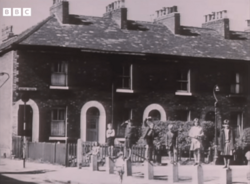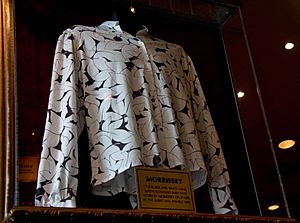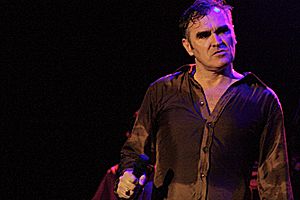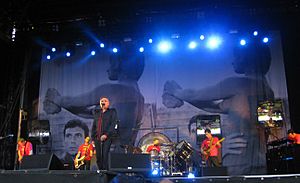Morrissey facts for kids
Quick facts for kids Morrissey |
|
|---|---|
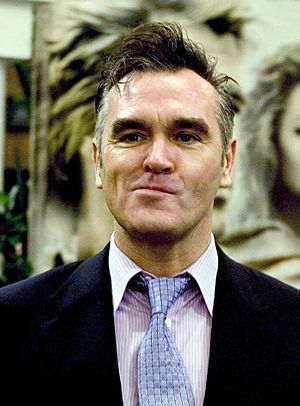
Morrissey in 2005
|
|
| Background information | |
| Birth name | Steven Patrick Morrissey |
| Born | 22 May 1959 Old Trafford, Lancashire, England |
| Genres |
|
| Occupation(s) |
|
| Years active | 1976–present |
| Labels | |
Steven Patrick Morrissey (born 22 May 1959), known simply as Morrissey, is an English singer and songwriter. He first became famous as the lead singer and lyricist of the rock band The Smiths, which was active from 1982 to 1987. After the band broke up, he started a successful solo career.
Morrissey's music is known for his deep baritone voice and unique lyrics. His songs often explore feelings of being an outsider, love, and loneliness, and they are famous for their clever and sometimes dark humor. He is considered a very important figure in the history of indie pop and indie rock music.
Contents
Early Life
Steven Patrick Morrissey was born in Old Trafford, Lancashire, England. His parents were working-class Irish immigrants who had moved to Manchester from Dublin. As a child, he loved literature, movies about everyday life, and 1960s pop music.
Morrissey did not enjoy his time at school. He later said that his formal education was an unpleasant experience. These feelings would later inspire some of his songs, like "The Headmaster Ritual" by The Smiths. After leaving school, he worked a few different jobs before deciding to focus on music and writing.
In the late 1970s, he briefly sang for a punk rock band called The Nosebleeds. He also wrote books about his favorite musicians and movie stars, including the New York Dolls and James Dean.
The Smiths
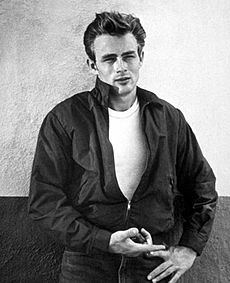
In 1982, Morrissey teamed up with guitarist Johnny Marr to form The Smiths. Morrissey chose the name because he thought it was time for "the ordinary folk of the world" to be represented in music. With Andy Rourke on bass and Mike Joyce on drums, the band quickly gained attention in the UK.
As the frontman, Morrissey stood out with his unique style, witty lyrics, and energetic stage presence. The band avoided the flashy trends of the time, creating a more down-to-earth image. Their music was often thoughtful and emotional, and they became known as one of Britain's most interesting and political groups.
The Smiths released their first album, The Smiths, in 1984. It reached number 2 on the UK charts. They followed this with three more successful studio albums: Meat Is Murder, The Queen Is Dead, and Strangeways, Here We Come. The Queen Is Dead is often considered one of the greatest albums of all time.
The band had many hit singles, including "This Charming Man," "Heaven Knows I'm Miserable Now," and "Panic." However, growing differences between Morrissey and Marr led to the band's breakup in 1987.
Solo Career
1988–1997: Going Solo
In 1988, Morrissey launched his solo career with the album Viva Hate. The album was a huge success, reaching number 1 on the UK charts. It included the hit singles "Suedehead" and "Everyday Is Like Sunday".
He continued to release popular albums throughout the early 1990s. Your Arsenal (1992), produced by David Bowie's guitarist Mick Ronson, was nominated for a Grammy Award. In 1994, his album Vauxhall and I also reached number 1 in the UK and was a critical success.
During this time, Morrissey's image changed. He became known for a more confident and masculine style. He also had a disagreement with his former bandmate from The Smiths over money, which was settled in court.
His next albums, Southpaw Grammar (1995) and Maladjusted (1997), also performed well on the charts. After these albums, Morrissey moved to Los Angeles and took a break from music for several years.
2004–2013: A Big Comeback
Morrissey returned to the spotlight in 2004 with his album You Are the Quarry. It was a major comeback, reaching number 2 in the UK and becoming a hit in the United States. The single "Irish Blood, English Heart" became the highest-charting single of his career.
He followed this success with more albums, including Ringleader of the Tormentors (2006) and Years of Refusal (2009). Both albums were praised by critics and fans. During this period, he toured all over the world, playing to sold-out crowds.
In 2013, Morrissey published his life story, titled Autobiography. The book was a bestseller in the UK.
2014–Present: Recent Work
Morrissey continued to release new music, including the albums World Peace Is None of Your Business (2014) and Low in High School (2017). In 2015, he also published his first novel, List of the Lost.
In 2019, he released California Son, an album of cover songs. His most recent studio album, I Am Not a Dog on a Chain, came out in 2020. He has continued to record new music and perform for his fans around the world. In 2025, he announced tour dates across the UK, Ireland, and Europe.
Artistry and Influence
Morrissey is known for his unique singing style and his clever, emotional lyrics. His songs often tell stories about feeling like an outsider, which has helped him connect with fans who feel the same way. He is also known for his dark humor and his criticism of authority.
He is considered one of the most important figures in the history of British pop music. The Smiths inspired a whole generation of indie rock and Britpop bands, including Oasis, Blur, and The Killers. Many artists have said that Morrissey's songwriting was a major influence on their own work.
Morrissey has a large and dedicated fanbase all over the world. He is particularly popular in the Hispanic community, especially in Mexico and among Mexican Americans. Many fans connect with the powerful emotions and romantic themes in his music.
Personal Views
Animal Rights
Morrissey is a passionate advocate for animal rights. He has been a vegetarian since he was 11 years old and is now a vegan. He has said that he refuses to eat anything that had a mother.
The title of The Smiths' 1985 album, Meat Is Murder, reflects his strong beliefs. He is a supporter of animal rights groups like PETA and has often used his concerts and interviews to speak out against animal cruelty.
Political Opinions
Throughout his career, Morrissey has been known for sharing his strong opinions on social and political issues. He has often criticized the British government and the monarchy in his songs and interviews. His outspoken nature has sometimes led to public debate and discussion.
Discography
The Smiths
- The Smiths (1984)
- Meat Is Murder (1985)
- The Queen Is Dead (1986)
- Strangeways, Here We Come (1987)
Solo
- Viva Hate (1988)
- Kill Uncle (1991)
- Your Arsenal (1992)
- Vauxhall and I (1994)
- Southpaw Grammar (1995)
- Maladjusted (1997)
- You Are the Quarry (2004)
- Ringleader of the Tormentors (2006)
- Years of Refusal (2009)
- World Peace Is None of Your Business (2014)
- Low in High School (2017)
- California Son (2019)
- I Am Not a Dog on a Chain (2020)
See also
 In Spanish: Morrissey para niños
In Spanish: Morrissey para niños
- List of animal rights advocates
 | Madam C. J. Walker |
 | Janet Emerson Bashen |
 | Annie Turnbo Malone |
 | Maggie L. Walker |


